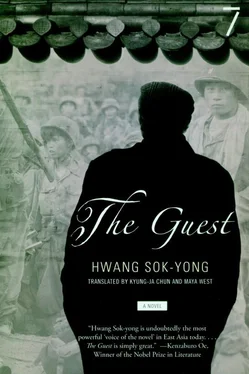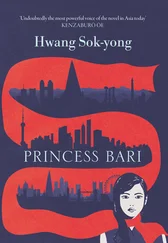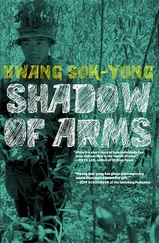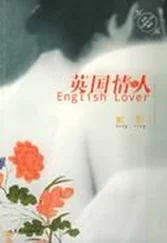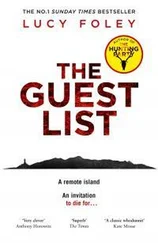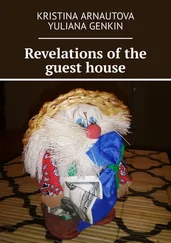“How do you do? I am the guide who will be helping you with your tour.”
Reverend Ryu responded with a nod. “Thank you.”
The female guide held up her pointer, indicating the chairman’s quote, and began to read aloud, “At a certain point in history, Engels identified the British Army as being the ‘most bestial’ of all armies. During World War II, the German fascists surpassed their cruelty. It was said that the human brain could not imagine any atrocity more cruel or more terrifying than those committed by the villain known as Hitler. However, here in Chosŏn, the Yankees actually managed to surpass Hitler and his rogues.”
With that, the woman turned to the right and employed her pointer once more to explain the nuances of a chart on the wall at the entryway to the exhibition room. The figures she rattled off didn’t really register with Yosŏp but he did hear phrases such as “destruction and burning of private residences,” “destruction of public buildings and irrigation systems,” “destruction of various mechanical instruments and facilities,” “destruction of various means of transportation,” not to mention “looting cattle,” “destruction and looting of farm tools,” and “destruction of farmland.”
Gradually, the guide’s voice grew louder and higher.
“During the Motherland Liberation War, the American Imperialist invaders committed the atrocity of manslaughter on a scale so grand as to be unprecedented in the entire history of Chosŏn, thus revealing to the world its bestial nature as a twentieth-century cannibal. The massacre that took place in Sinch’ŏn, as ordered by Harrison the Vampire, then acting commander of the Americans soldiers stationed in Sinch’ŏn, surpassed by far the bloody horrors of Hitler’s World War II concentration camps. The American Imperialist invaders ordered that anything that lived and moved in Sinch’ŏn be buried under ashes, and over a period of fifty-two days they slaughtered 35,383 innocent people — one quarter of Sinch’ŏn’s entire population — in the most cruel and vicious ways. This fiendish atrocity shall never be forgiven, not in a thousand years.”
Most of the exhibits were made up of photographs, but posters and foreign newspaper clippings from the time period were also pasted up all over the place. A separate group of men and women appeared to be in the middle of their own tour — every now and then a young man could be heard explaining the different exhibits. The strident intonation of Yosŏp’s female guide reached its peak as they reached a box-like display inside a wood-panel compartment on the cement floor. Thinking it was just a heap of miscellaneous objects placed atop a box, Yosŏp moved forward to get a closer look. It was a pile of shoes. The first to catch his eye was a pair of women’s white komusin. 28One of the pair was severed in half, right through the center, and completely discolored — it was now a dirty yellow. A crumpled pair of dress shoes, several shoe heels with rusty nails sticking out of them, tiny children’s black komusin , a single bedraggled black tennis shoe with a broken shoestring, countless telephone lines all tangled into a ring the size of a bracelet, and thick metal wires — their owners no longer existed, and seeing so many empty shoes, shoes that were once worn, made the absence of the dead that much more conspicuous. A cool breeze blew in through the screen in the open window but Yosŏp felt a sudden burst of sweat cover the back of his neck. He fancied that he could hear his heart murmur,I know. They must have dug these things out of the pit. All of a sudden, he thought he heard the faint sound of a violin.
Endlessly long, hot summer days,
always you bloomed so gorgeously.
Beautiful maids, maids pure and true,
once smiled and played, welcoming you.
As Yosŏp trailed along behind the female guide, the other tour group was in the process of moving on to the next room. A couple of the stragglers in the group casually glanced back in his direction. In that fleeting instant Yosŏp saw clearly Uncle Sunnam, wearing the shabby, pale green people’s uniform buttoned all the way up to his chin. As if that weren’t enough, the other man turned his head and grinned at Yosŏp over Sunnam’s shoulder — it was Ichiro Illang, his head shaved clean as it had always been. I can’t believe they followed me all the way out here. As soon as the tail of this group disappeared into the next room, Yosŏp began to wonder whether all the tourists in the group might not be dead.
Trying to catch up to them, Yosŏp quickened his pace, making his way towards the next exhibition room. All Back, who’d been following close behind, pulled him lightly by the sleeve.
“Reverend, we aren’t through with this room yet.”
Yosŏp turned back and saw the female guide staring at him blankly, her pointer still held up in midair. The county’s party secretary and the director of the museum both stood quite still, their hands clasped behind their backs. With a foolish look on his face, Reverend Ryu turned again towards the entrance of the room that the other visitors had disappeared into. He asked the museum guide, “Those people in front of us — where did they come from?”
Bewildered, she asked him back, “Why? Did you see someone you know?”
“Well, no, it’s not that, just. there definitely was a big tour group in front of us, right?”
Listening to their exchange, the director of the museum cut in.
“People from all over the country organize group tours to come visit our museum.”
Only then was Yosŏp convinced that they had actually been real people, visible to others as well as himself. He realized that the war was not yet over in this place. His tongue felt dry. He was thirsty, out of breath, and, above all, anxious. He wanted to find someplace to hide in, to run away to.
“On October 18, the day that followed the beginning of their occupation, the fiendish American Imperialist murderers enacted the mass slaughter that they had been planning for so long. Locking up approximately nine hundred citizens, including some three hundred women and children, in an air-raid shelter in Sinch’ŏn, they covered the whole area in gasoline and burned them all to death. When we are through here, we will go visit the site of this atrocity. On the nineteenth and the twenty-third, in a trench situated near the air-raid shelter, the Americans killed no less than six hundred people, some of whom were buried alive and others who were, once more, set on fire. In this way, the number of people murdered in the air-raid shelter and in the trench alone amount to approximately 1,530.”
The exhibits in the next room were largely made up of so-called murder weapons. They had, most likely, been found in the nearby fields and mountains. There were rusty swords, broken M-1 bayonets and pistols, machine guns, M-1 rifles with only the barrels intact, carbines, and helmets full of holes from all the rust. The bayonets were discolored, and the dark red rust on the concave part of the blade made them look stained with blood.
In yet another room, the female guide showed Yosŏp the bust of a young boy who had refused to disown the Party and paid for it with his own life. There were also photographs of a reservoir where, the guide claimed, people had been drowned en masse, as well as a hot-spring resort where countless women had been raped before they were thrown into a pond and blown up with grenades. Workers at the Sinch’ŏn Rice-processing Factory had been tied to oxcarts and pulled from both sides, tearing their bodies apart. The walls were packed from top to bottom with photographs of dead bodies.
By the time they came back out the front door where the tour had started, Yosŏp’s shirt was soaked through with sweat. The museum director spoke to Yosŏp: “The air-raid shelter is over there, still exactly the same as it was then. We’ll see that first before we move on to the site of the massacre in Wŏnamni. Then we’ll be done.”
Читать дальше
